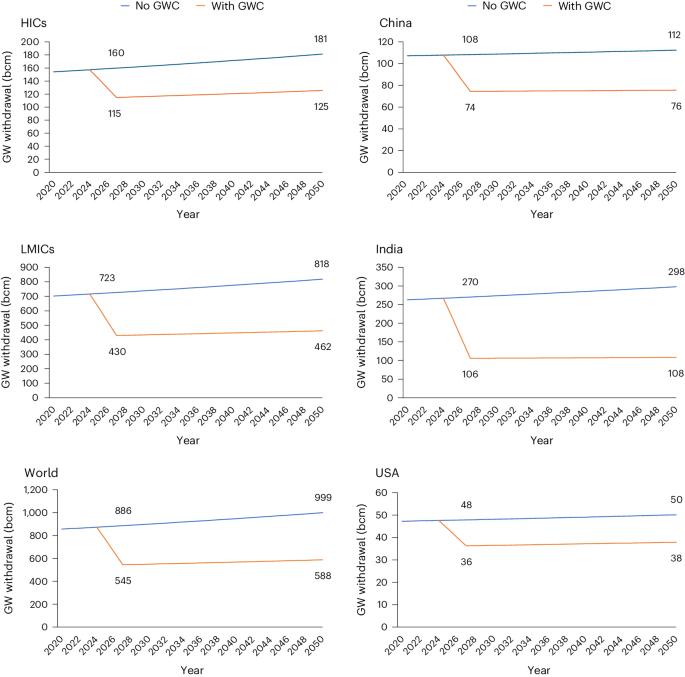Ending groundwater overdraft without affecting food security
IF 27.1
1区 环境科学与生态学
Q1 ENVIRONMENTAL SCIENCES
引用次数: 0
Abstract
Groundwater development is key to accelerating agricultural growth and to achieving food security in a climate crisis. However, the rapid increase in groundwater exploitation over the past four decades has resulted in depletion and degradation, particularly in regions already facing acute water scarcity, with potential irreversible impacts for food security and economic prosperity. Using a climate–water–food systems modelling framework, we develop exploratory scenarios and find that halting groundwater depletion without complementary policy actions would adversely affect food production and trade, increase food prices and grow the number of people at risk of hunger by 26 million by 2050. Supportive policy interventions in food and water systems such as increasing the effective use of precipitation and investments in agricultural research and development could mitigate most negative effects of sustainable groundwater use on food security. In addition, changing preferences of high-income countries towards less-meat-based diets would marginally alleviate pressures on food price. To safeguard the ability of groundwater systems to realize water and food security objectives amidst climate challenges, comprehensive measures encompassing improved water management practices, advancements in seed technologies and appropriate institutions will be needed. Reducing groundwater extraction to sustainable levels may have detrimental impacts on global food security. Improving rainfed water use efficiency and investments in agricultural research and development can ensure sustainable groundwater resources and food security into the future.

在不影响粮食安全的情况下终止地下水超采
开发地下水是加快农业增长和在气候危机中实现粮食安全的关键。然而,过去四十年来地下水开采量的快速增长导致了地下水的枯竭和退化,尤其是在已经面临严重缺水的地区,这可能会对粮食安全和经济繁荣造成不可逆转的影响。利用气候-水-粮食系统建模框架,我们提出了一些探索性方案,发现如果不采取辅助性政策措施来阻止地下水枯竭,将对粮食生产和贸易产生不利影响,提高粮食价格,到 2050 年,面临饥饿风险的人口将增加 2600 万。对粮食和水系统采取支持性政策干预措施,如增加降水的有效利用和对农业研发的投资,可减轻地下水可持续利用对粮食安全的大部分负面影响。此外,改变高收入国家的偏好,减少以肉类为主的饮食,也会在一定程度上减轻对粮食价格的压力。为了在气候挑战中保障地下水系统实现水和粮食安全目标的能力,需要采取综合措施,包括改进水管理方法、种子技术进步和适当的机构。将地下水开采量降至可持续水平可能会对全球粮食安全产生不利影响。提高雨水灌溉用水效率,投资农业研发,可以确保未来地下水资源的可持续利用和粮食安全。
本文章由计算机程序翻译,如有差异,请以英文原文为准。
求助全文
约1分钟内获得全文
求助全文
来源期刊

Nature Sustainability
Energy-Renewable Energy, Sustainability and the Environment
CiteScore
41.90
自引率
1.10%
发文量
159
期刊介绍:
Nature Sustainability aims to facilitate cross-disciplinary dialogues and bring together research fields that contribute to understanding how we organize our lives in a finite world and the impacts of our actions.
Nature Sustainability will not only publish fundamental research but also significant investigations into policies and solutions for ensuring human well-being now and in the future.Its ultimate goal is to address the greatest challenges of our time.
 求助内容:
求助内容: 应助结果提醒方式:
应助结果提醒方式:


